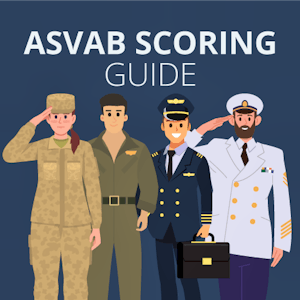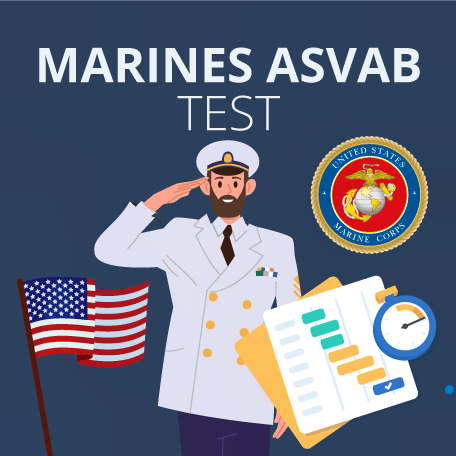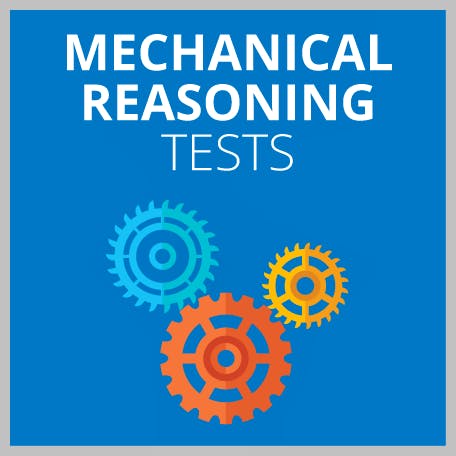ASVAB Scoring: Detailed Guide
Updated November 18, 2023

- What Is in the ASVAB Test Score Report?
empty
empty
empty
- How to Interpret the Different ASVAB Scores?
empty
empty
empty
empty
empty
- What Is the Minimum ASVAB Score for Army?
- Frequently Asked Questions
- Final Thoughts

While the minimum ASVAB score varies between military branches, the minimum acceptable score is 31.
However, as the majority of candidates score between 30 and 70, you want to aim for a percentile rank of at least 60.
The ASVAB Test Score Report is a valuable document that provides detailed information about your aptitudes, skills, and qualifications for military service.
It includes Career Exploration Scores to guide career choices, individual scores on ASVAB subtests to assess specific abilities and the critical AFQT score that determines your eligibility for enlistment.
Understanding the information presented in this report is essential for making informed decisions about your military career options.
What Is in the ASVAB Test Score Report?
The ASVAB (Armed Services Vocational Aptitude Battery) Test Score Report provides a comprehensive overview of your performance on the ASVAB test, which is a critical step in the military enlistment process.
The report helps you and military recruiters assess your aptitudes, skills, and potential for various military occupations.
Here's a breakdown of what you can find in the ASVAB Test Scores Report:
Career Exploration Scores
The Career Exploration Scores section provides information about your aptitude in different areas.
These scores are derived from specific ASVAB subtests and help identify your strengths and weaknesses in various skill areas.
This information is essential for matching you with suitable military career options.
ASVAB Subtests
The ASVAB consists of several subtests each measuring different skills and abilities.
The Test Score Report typically includes your scores on these subtests.
Examples of ASVAB subtests include:
- Arithmetic Reasoning – Your ability to solve mathematical word problems
- Word Knowledge – Vocabulary and language skills
- Mechanical Comprehension – Understanding of mechanical concepts and principles
- Electronics Information – Knowledge of basic electronics
- General Science – General scientific knowledge
- Auto and Shop Information – Understanding of automotive and mechanical systems
- Paragraph Comprehension – Your ability to understand and interpret written information
- Mathematics Knowledge – Tests your math skills, including algebra and geometry
These subtest ASVAB scores provide detailed insights into your capabilities and can help military recruiters match you with a suitable career path within the armed forces.
Armed Forces Qualification Test (AFQT)
The AFQT score is one of the most crucial aspects of the ASVAB Test Score Report.
It's a composite score calculated from your performance on specific subtests, including Arithmetic Reasoning, Word Knowledge, Paragraph Comprehension and Mathematics Knowledge.
The AFQT score is used to determine your eligibility for military service and is often the primary factor considered by recruiters when assessing your qualifications.
How to Interpret the Different ASVAB Scores?
Interpreting the ASVAB score chart involves understanding:
- How the scores are calculated
- What types of scores are shown on the report
- What constitutes good ASVAB scores
How the ASVAB Scores are Calculated
ASVAB scores are calculated using a statistical model called Item Response Theory (IRT).
This model takes into account the difficulty of the questions and your performance on those questions.
Here's how it works:
Each ASVAB question is assigned a difficulty level based on the percentage of people who answer it correctly.
When you answer a question correctly, you receive a higher score, and when you answer it incorrectly, you receive a lower score.
The IRT model considers not only whether you answered a question correctly or incorrectly but also the difficulty of the questions you answered correctly or incorrectly.
Therefore, getting more difficult questions right can result in a higher score than getting easier questions right.

If you need to prepare for a number of different employment tests and want to outsmart the competition, choose a Premium Membership from JobTestPrep.
You will get access to three PrepPacks of your choice, from a database that covers all the major test providers and employers and tailored profession packs.
Types of Scores on the ASVAB Report
The ASVAB scores for army jobs include several types of scores.
- Standard Scores – These scores are calculated using the IRT model and are scaled to have a mean (average) of 50 and a standard deviation of 10. Standard scores are used to compare your performance to a representative sample of the population.
- Percentile Scores – These scores indicate your ranking compared to other test takers. For example, if your percentile score is 70, it means you scored better than 70% of the people who took the ASVAB.
- Composite Scores – These scores are created by combining your standard scores from specific ASVAB subtests. Composite scores are used to determine eligibility for specific military jobs.
These scores fall into 10 categories, such as:
- Clerical (CL) – Word Knowledge (WK), Paragraph Comprehension (PC), Arithmetic Reasoning (AR) and Mathematics Knowledge (MK).
- Combat (CO) – Word Knowledge (WK). Paragraph Comprehension (PC), Auto and Shop Information (AS) and Mechanical Comprehension (MC).
- Electronics (EL) – General Science (GS), Arithmetic Reasoning (AR), Mathematics Knowledge (MK) and Electronic Information (EI).
- Field artillery (FA) – Arithmetic Reasoning (AR), Mathematics Knowledge (MK), and Mechanical Comprehension (MC).
- General Maintenance (GM) – General Science (GS), Auto and Shop Information (AS), Mathematics Knowledge and Electronics Information.
- General technical (GT) – Word Knowledge (WK), Paragraph Comprehension (PC), and Arithmetic Reasoning (AR).
- Mechanical maintenance (MM) – Auto and Shop Information (AS), Mechanical Comprehension (MC) and Electronic Information (EI).
- Operators and food (OF) – Word Knowledge (WK), Paragraph Comprehension (PC), Auto and Shop Information (AS) and Mechanical Comprehension (MC).
- Surveillance and communications (SC) – Word Knowledge (WK), Paragraph Comprehension (PC), Arithmetic Reasoning (AR), Auto and Shop Information (AS), and Mechanical Comprehension (MC).
- Skilled technical (ST) – Word Knowledge (WK), Paragraph Comprehension (PC), General Science (GS), Mechanical Comprehension (MC) and Mathematics Knowledge (MK).
- AFQT (Armed Forces Qualification Test) Score – The AFQT score is a specific composite score that focuses on four subtests: Arithmetic Reasoning, Word Knowledge, Paragraph Comprehension, and Mathematics Knowledge.
The AFQT score is crucial for determining your eligibility for military service, with higher scores leading to more career options.
What Are Good ASVAB Scores?
Here is a general guideline for the ASVAB score range and what can be considered good ASVAB scores, depending on the specific branch of the military and the job you're interested in.
As the scores are out of 100, the average ASVAB score or median percentile is 50.
| AFQT Category | Score Range |
|---|---|
| I | 93 to 99 |
| II | 65 to 92 |
| IIIA | 50 to 64 |
| IIIB | 31 to 49 |
| IVA | 21 to 30 |
| IVB | 16 to 20 |
| IVC | 10 to 15 |
| V | 1 to 9 |
AFQT Score
This is the most crucial score. Concerning calculating ASVAB score, you will want to aim for at least 31. However, the different branches of the military all have different requirements
You might also want to consider that for better job opportunities and more career choices, you should aim for a score well above the minimum.
Scores above 50 are considered competitive.
Standard Scores
Generally, a standard score of 50 is average, but what constitutes a "good" score depends on your goals. Scores above 60 are considered above average, while scores below 40 may limit your job options
What Is the Minimum ASVAB Score for Army?
- Army – The minimum ASVAB score for the army is 31. You will also be required to score well on one or more of the ASVAB speciality subtests.
- Air Force – To qualify for the Air Force, you need a score of 36+ (for high school seniors and graduates), or 50+ (for those with a GED). You will also need to meet the minimum requirements in the Verbal Expression (WK + PC) and Arithmetic Reasoning (AR) subtests.
- Marine Corps – To enlist in the Marine Corps, you need a score of 32+ (high school grad) or 50+ (GED). You will also need to meet the minimum scores for one or more of the speciality subtests.
- Navy – The ASVAB line scores for the Navy are 35+ and 50+. You will also need to pass several subtest specialities.
- Coast Guard – The minimum ASVAB score is 36 or 47 for those with a GED.
- National Guard – To qualify for the National Guard, you need a score of 31+ (for high school seniors and graduates), or 50+ (for those with a GED).
Frequently Asked Questions
You will receive your ASVAB scores from your school counselor or ASVAB program specialist.
Your score includes Career Exploration Scores, individual ASVAB subtest scores, composite scores, and the crucial Armed Forces Qualification Test (AFQT) score.
ASVAB scores reflect your abilities in specific skill areas, helping to match you with suitable military occupations.
These scores, calculated through the Item Response Theory (IRT) model, include standard scores, percentile scores, composite scores and the critical Armed Forces Qualification Test (AFQT) score, determining your eligibility for military service and potential career paths.
ASVAB scores are valid for two years.
The scoring system is based on the Item Response Theory (IRT), yielding standard, percentile and composite scores, along with the vital Armed Forces Qualification Test (AFQT) score.
However, the scores or numbers you are looking for are at least 31, or a percentile rank of 50.
You typically receive your ASVAB score two weeks after the test. However, you can request them anytime from three months to two years after your test date.
ASVAB scores operate through the Item Response Theory (IRT), incorporating standard, percentile and composite scores, alongside the AFQT score.
Calculated based on question difficulty and response accuracy, these scores evaluate your abilities across diverse skill domains, determining your eligibility and potential within the military.
Composite scores on the ASVAB come from combining individual subtest scores to assess specific skill areas critical for various military occupations.
These scores enable recruiters to evaluate your overall aptitude and qualifications, determining your eligibility for particular roles within the armed forces.
Final Thoughts
The ASVAB test score report serves as a crucial tool for understanding your aptitudes and qualifications within the context of military service.
By examining your Career Exploration Scores, ASVAB subtest results, and composite scores, you can gain valuable insights into your abilities and potential career paths.
Understanding the significance of the Armed Forces Qualification Test (AFQT) score and the various composite scores is essential for making informed decisions about pursuing a fulfilling and suitable military career.












